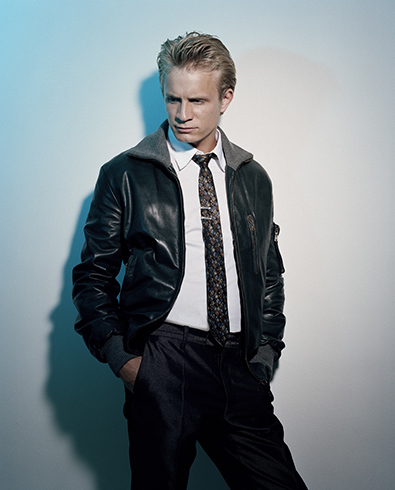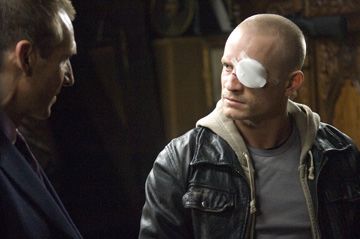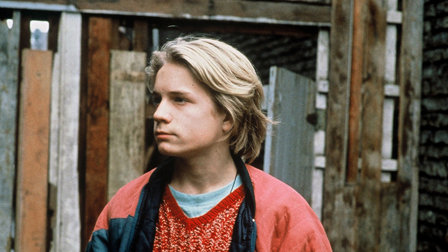Craig from Dark Eye Socket here with another Take Three. Today: Jérémie Renier

Take One: Private Property/Nue propriété (2006)
Joachim Lafosse’s beautifully-crafted French family drama Private Property, starred arthouse doyenne Isabelle Huppert alongside Renier and his brother Yannick (also an actor). They're just about getting on in a country house that non-identical twins Thierry (Jérémie) and François (Yannick) don’t want to sell, but Mater Dearest does; the live-away father/ex-husband backs the twins – and it’s his house. The drama is all about the to and fro of this looming possibility, the elephant smack bang in the front room and pregnant with the biggest pause imaginable. Lafosse curiously shapes his narrative with inharmonious tension between the three: it’s sometimes sexual, sometimes queasily thick, and most times unavoidable. Freud would’ve loved a visit with this Gallic clan.
Renier plays the pivotal character; an invisible finger seems to poke us into scrutinising him more than the others. Though the twins share a bond and personality traits, hes' the independent one. The connection between these adult brothers is still very adolescent (computer games, play fights etc) and proves to be part of the family’s undoing. Everyone is excellent (come on, it’s Huppert!), but Renier has the most baggage to haul. In a scene where his childishness is on full display he hides from the family in nearby woods. Renier's face goes blank and he seems to be disappearing inside himself. It's incredibly powerful, but he handles extensive complex, quick-fire dialogue just as maturely as an actor. Thierry is one of his strongest recent roles.
Take Two: In Bruges (2008)

Martin McDonough’s In Bruges holds a small, throwaway role for Renier, an elevated cameo if you will. Eirik, a scarred drug dealer, is uncharacteristic of his typical parts and a nice jolt of fresh air for the dramatic actor. It's also one of only a handful of times where Renier speaks English, not French onscreen. He’s not outright hilarious in In Bruges, but his part doesn't call for him to be knowingly funny, just the inept third- tier henchman/lackey who is used to advance the plot in directions it needs to go.
Eirik is the thieving ex-boyfriend of Chloë (Clémence Poésy), the girl who Colin Farrell’s bored hitman woos; he's the butt of several of the film's jokes. He's literally the fall guy in one early scene, where Farrell shoots him in the eye for comic relief comic relief and he wails on the ground as Farrell then mocks him. He spends the remainder of the film with a cotton eye patch and a grudge. The role is essentially a snappy little CV filler, a humorous stop-gap between bigger, meatier roles. But it’s also the kind of role that any actor – on the way up, down or comfortably stationary in mid-career – should consider taking on. An against type guest part in a well-profiled film can remind us how good the given actor is, how versatile they can be. So let the art of the extended cameo continue.
 Take Three: La promesse/The Promise (1996)
Take Three: La promesse/The Promise (1996)
Renier has worked with Belgian directing brothers the Dardennes (Can I say ‘the Dardi’ in homage to The Social Network?) four times: L’ enfant/The Child, Le silence de Lorna/Lorna’s Silence, their new Cannes contender The Kid with a Bike/Le gamin au vélo and their first collaboration, La promesse, made in 1996 when Renier was onlly 15. He plays Igor, Olivier Gourmet’s son and assistant in his small construction business in the district of Liege, Belgium where they live. More problematically, he's also his father's gofer in illegal labour scams. The titular promise arises when one worker is injured and makes a deal with Igor to, should he need to, take care of his family. The crux of the story swings on that very pertinent hinge: Igor does need to.
La promesse was only Renier’s second film but he handled lead duties with a real unaffected spirit. He was a pro from the off. It’s a portrait of youth, but not an idealised one. Igor’s journey through adolescence is depicted as a state of inescapable instability. There’s go-karting and visits to illicit gambling dens. And Tipp-Exing your teeth is something we all probably did as kids, but not right after forging the passports of immigrant workers, I’m guessing. Igor leads a tough, unusual life; easy was never an option for him. As representations of innate youthful decency go, Renier is nigh on matchless; this performance is up there with Enzo Staiola in Bicycle Thieves and Anne Wiazemsky in Au hasard Balthazar.
Three more key films: Criminal Lovers (1999), L’ enfant (2005), Summer Hours (2008, which I wrote about last year)